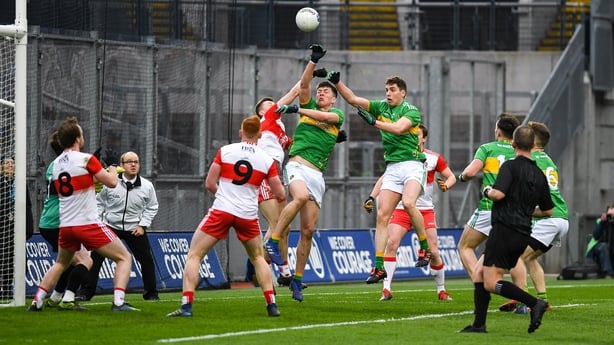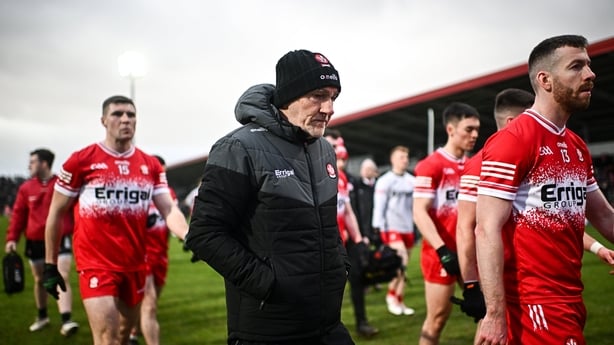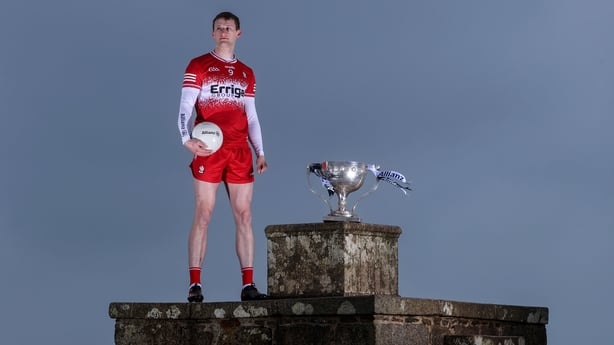This weekend five years ago, Brendan Rogers started at full-back as Derry saw off Leitrim in the Division 4 final.
If that bottom-tier decider was a celebratory occasion for Leitrim - their first runout in HQ since the famous All-Ireland semi-final a quarter of a century earlier - it was considered a grim business for Derry, ideally to be completed briskly and best forgotten.
That they were down there at all was deemed a shocking turn of events. Having contested the Division 1 final in 2014, where they were blown out of it after half-time, they had slipped down three tiers in the space of four years.
As we now know, they have returned to the summit just as quickly. Exactly 10 years after the 2014 league final, they are back again - facing the same opposition. A fitting bookend to a decade where they scaled sickening lows and thrilling highs. As good a moment as any to take stock.
"It was probably unforeseeable that you would go up so quickly in all the divisions," Rogers told RTÉ Sport this week, ahead of their meeting with Dublin.
"Once we got promoted from Division 4, we had a change of management in Rory Gallagher. He quickly made it very clear, the ambitions (he had) and where he saw this team going.
"He said we would win Ulster championships, he said we would be competing for All-Irelands and there'd be players winning All-Stars and (individual) accolades and things like that.
"Probably initially, we were all, like, 'you're mad!'
"As time went on, you started believing in the methods that were being laid out for us. You could start seeing the team get better. Our performances were improving and were more consistent in nature.

"You start stringing together results that we'd never had before. The belief comes quickly. The shift in mindset was brilliant for the team. It quickly became a winning mentality.
"We managed to get up from Division 4 to Division 1 in five years. It's been a rollercoaster journey. A lot has happened.
"It's been a long journey. Hopefully, it can go a wee bit further."
One major difference between the Derry side that reached the league final in 2014 and the Derry team of 2024 is that the latter are undisputed bona fide All-Ireland contenders.
Even in real time, it was presumed that Derry's 2014 campaign was a seasonal outler - and, of course, the county had and have a decent heritage in the league, winning four titles in the 1990s and another in 2008. That summer, they wound up being eliminated by Longford in the first round of the qualifiers.
The Derry 2020s crop are a considerably more feared outfit, now gunning to become the first team to win three Ulsters on the trot since Armagh in the mid-2020s.
Nonetheless, in Rogers estimation, they're still a 'developing' team and that development needs to be validated by silverware. Where there's been much talk of other counties rationining their resources with a view to peaking later on, Derry have, as in previous years, prioritised momentum and gone bull-headed for every competition.
Only against Dublin in Celtic Park was there any significant rotation, with Conor Glass rested for the visit of the All-Ireland champions.
"In one side of the mind, you're thinking, look, we need to be sure we're going to stay in the Division," Rogers says.
"But we did say at the start of the year we wanted to win every competition we entered.
"We wanted to win the McKenna Cup, we made that very clear. And we wanted to win the league. That was the next step.
"We do want to be in a league final. We want to be winning the trophy. Ultimately, we're still a team developing. And in order to solidify a development, you need success to go along with it. A national title is another thing to add to that list of honours for us."

The Derry midfielder certainly isn't feeling the apathy towards a league title that other managers have displayed, on occasion, over the spring.
"The mentality is, why would you bother entering a competition in the first place if you didn't want to win it.
"No one goes out to play any game on any given day and say, yeah we're happy to lose this. That's madness. Why would you be bothered in sport any other way?
"How other people want to manage their bodies and manage their teams is one thing but I just can't fathom how you would turn your nose up at any silverware."
In the off-season, Tyrone managerial legend Mickey Harte stunned the province of Ulster - and beyond - by departing the Louth post to take the Derry role.
At the time, it was a bridge too far for some of the diehards on either side of the Tyrone-Derry divide, though all involved seem to have adjusted to the new reality in the period since.
With Derry only narrowing edged out in last July's All-Ireland semi-final and now bracketed in what was come to be branded as a 'top three' this spring, Harte's job has been one of further fine-tuning an already well designed machine.
"We'd a lot of things in place for him coming in," says Rogers. "Which was a good start for him, I'd imagine. The team was in a relatively stable state.
"They get to come in and do a lot of refinement. It's not exactly bulk changes.
"Introducing new players is one aspect of it. Maintaining that winning mentality. The tactical elements that himself and Gavin Devlin bring to the table is phenomenal. Their detail in certain aspects that we probably need progression on has been very, very good.
"I suppose they were fortunate in one way that we were quite stable but in an other way, they do have the experience and expertise to specialise in other areas that we need. It's quite a good balance and there's quite a lot learned in the first few months anyway.
"Hopefully there's a lot more growth in us. That's ultimately what they seen in us when they wanted the job as well. I think it's suiting both parties at the minute."
Needless to say, Derry collected the McKenna Cup title - a competition that Harte virtually owned while in charge of Tyrone (some were even convinced he'd somehow manage to win it with Louth) - and have racked up six wins from seven in Division 1, the only blot against Dublin.
They've racked up 13 goals in seven games, with a fair portion coming from defenders - Conor McCluskey may be recalled as the original goalscoring corner-back. Rogers instances their commitment to developing a "spread of scorers" across the entire team as key to their whole attacking game. Though he hesitates when asked to identify their most "complete" display in 2024.
"If I'm being honest, I don't think there was a game where we played a complete performance. There were days when I thought we did certain aspects really well.
"The likes of the Mayo game, our frontline press was really good. But were we as good on the break ball out the back, probably not? As one thing was really good, something else wasn't as good on them days.
"I thought our threads of attack were a lot more clinical against Kerry, even though it was a low scoring game.
"There's so many aspects that were really good in certain games but it's so easy to pick something negative. I think that's maybe a good thing. That we're not having complete performances yet. Because this is not the time of the year when you want them either."
Asked to instance Derry's development since ultimately falling short last summer, Rogers cites their increasing depth.
"We've grown our panel ever so slightly. The likes of Diarmuid Baker and Donncha Gilmore have been a bit more consistent in our team. Lachlann Murray has started a lot more games.
"Did we have as much impact off the bench as we would have liked last year in that Kerry game? Probably not.
"We now have the opportunity to grow the panel and make the impact later in the game. Maybe that was our missing difference."

The tight timeframe between the conclusion of the league and the beginning of the championship - highlighted most glaringly by Mayo winning the league title last year seven days before losing their Connacht championship opener - has convinced many that league deciders are an unnecesary appendage in the season.
Peter Canavan argued on League Sunday that the integrity of the competition would be best served by dispensing with them and awarding the title to the 1st placed team after seven rounds.
While this reform would have resulted in Derry lifting the league trophy in Celtic Park after beating Roscommon last Sunday, Rogers is nonetheless emphatically opposed to the idea of ditching the showpiece.
"Was it a massive moment a few years back when we played Leitrim in the final, for them? 100%. There was maybe 30,000 people from Leitrim at the game.
"That meant the world to them. And it meant the world to us too. Because it was progression. You got out from Division 4 to Division 3.
"Any day you get up the steps of Croke Park to win a trophy. That's massive for anybody. Why would this be any different?
"You only have to look at the finals this weekend. Derry will play Dublin in Division 1 and Donegal will play Armagh in Division 2. That's a brilliant double header for any occasion.
"I understand where Peter is coming from. Is there a lot of games in a lot of weeks? I suppose that's the case. But it's the nature of the split season.
"But ultimately, we're trying to grow the sport. You can't grow it by taking away games, by taking away finals.
"A lot of teams that have won national leagues over the years have really cherished it. No one ever turns around and says I wish I didn't win it."
Listen to the RTÉ GAA Podcast on the RTÉ Radio Player, Apple Podcasts, Spotify, or wherever you get your podcasts.


